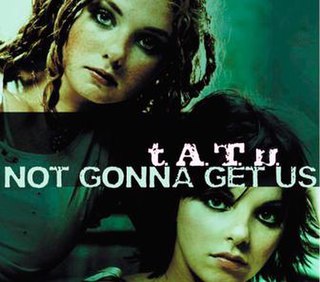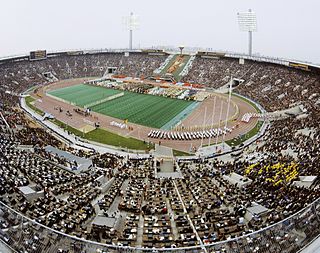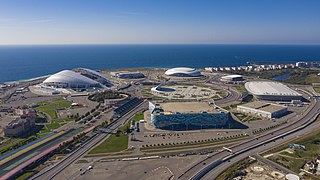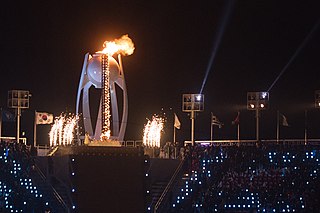
The 2014 Winter Olympics, officially called the XXII Olympic Winter Games and commonly known as Sochi 2014, were an international winter multi-sport event that was held from 7 to 23 February 2014 in Sochi, Russia. Opening rounds in certain events were held on 6 February 2014, the day before the opening ceremony.
The opening ceremony of the 2004 Summer Olympics was held on August 13, 2004 starting at 20:45 EEST (UTC+3) at the Olympic Stadium in Marousi, Greece, a suburb of Athens. As mandated by the Olympic Charter, the proceedings combined the formal and ceremonial opening of this international sporting event, including welcoming speeches, hoisting of the flags and the parade of athletes, with an artistic spectacle to showcase the host nation's culture and history. 72,000 spectators attended the event, with approximately 15,000 athletes from 202 countries participating in the ceremony as well. It marked the first-ever international broadcast of high-definition television, undertaken by the U.S. broadcaster NBC and the Japanese broadcaster NHK. The Games were officially opened by President of the Hellenic Republic Konstantinos Stephanopoulos at 23:46 EEST (UTC+3).

The 2014 Winter Paralympics, the 11th Paralympic Winter Games, and also more generally known as the Sochi 2014 Paralympic Winter Games, were an international multi-sport event for athletes with disabilities governed by the International Paralympic Committee (IPC), held in Sochi, Russia, from 7 to 16 March 2014. 45 National Paralympic Committees (NPCs) participated in the Games, which marked the first time Russia ever hosted the Paralympics. The Games featured 72 medal events in five sports, and saw the debut of snowboarding at the Winter Paralympics.

"Not Gonna Get Us" is a song by the Russian music duo t.A.T.u. for their first English-language album, 200 km/h in the Wrong Lane (2002). Interscope Records released it on 21 April 2003 as the second single from the album. It was originally released as "Nas Ne Dogonyat" on t.A.T.u.'s debut album, 200 По Встречной (2001). The song was written by Sergio Galoyan, Trevor Horn, Elena Kiper and Valery Polienko, while production was handled by Horn. "Not Gonna Get Us" is a Eurodance-inspired song, and lyrically it talks about the group running away from people as they don't understand their love towards one another. The song was included on the duo's compilation album The Best (2006).

Fisht Olympic Stadium is an outdoor stadium in Sochi, Russia. Located in Sochi Olympic Park and named after Mount Fisht, the 40,000-capacity stadium was constructed for the 2014 Winter Olympics and Paralympics, where it served as the venue for their opening and closing ceremonies.

The Olympic Games ceremonies of the Ancient Olympic Games were an integral part of these Games; the modern Olympic games have opening, closing, and medal ceremonies. Some of the elements of the modern ceremonies date back to the Ancient Games from which the Modern Olympics draw their ancestry. An example of this is the prominence of Greece in both the opening and closing ceremonies. During the 2004 Games, the medal winners received a crown of olive branches, which was a direct reference to the Ancient Games, in which the victor's prize was an olive wreath. The various elements of the ceremonies are mandated by the Olympic Charter, and cannot be changed by the host nation. This requirement of seeking the approval of the International Olympic Committee (IOC) includes the artistic portion of opening and closing ceremonies.
Leonid Rudenko, better known by his stage name, Rudenko, is a record producer and DJ from Russia, who was born and raised in Moscow.

The opening ceremony of the 2010 Winter Olympics was held on February 12, 2010, beginning at 6:00 pm PST at BC Place Stadium in Vancouver, British Columbia, Canada. This was the first Olympic opening ceremony to be held indoors. It was directed by David Atkins.

The closing ceremony of the 2010 Winter Olympics took place on February 28, 2010, beginning at 5:30 pm PST at BC Place Stadium in Vancouver, British Columbia, Canada. It was the first Olympic Closing Ceremony held in an indoor venue since the 1984 Winter Olympics in Sarajevo.

The Opening Ceremony of the 1980 Summer Olympics was the official opening ceremony held in the afternoon at 16:00 Moscow Time (UTC+3) on 19 July 1980 in the Grand Arena of the Central Lenin Stadium. It was attended by the Chairman of the Presidium of the Supreme Soviet of the USSR, Leonid Brezhnev, and IOC President Lord Killanin.

The Closing Ceremony of the 1980 Summer Olympics was held at 19:00 Moscow Time (UTC+3) on 3 August 1980 at the Grand Arena of the Central Lenin Stadium. It was attended by the Chairman of the Presidium of the Supreme Soviet of the USSR, Leonid Brezhnev. IOC President Lord Killanin closed the Games for the final time and passed the position on to Juan Antonio Samaranch.

Sochi Olympic Park is an Olympic Park in Sochi, Russia. It situated in the urban-type settlement of Sirius in Imeretinsky Valley, on the coast of the Black Sea. The Olympic Park houses the main Olympic Stadium used for the Games' ceremonies, and the venues that were used for indoor sports such as hockey, figure skating, curling, and speed skating. It also houses training facilities, the Olympic Village, the international broadcasting centre, and other amenities. The park was designed so that all of the venues would be accessible within walking distance of each other. The venues are situated around a water basin containing a fountain known as "The Waters of the Olympic Park".

Belgium competed at the 2014 Winter Olympics in Sochi, Russia from 7 to 23 February 2014. The team consisted of seven athletes in five sports, one less than in 2010. The goal of the team was a few top-8 performances.

2014 Winter Olympics Parade of Nations was part of the opening ceremony at the 2014 Winter Olympics. The national team from each nation participating in the Olympic Games was preceded by their national flag flag bearer into Fisht Olympic Stadium in the host city of Sochi, Russia. The flag bearer was an athlete of each national delegation chosen, to represent the athletes, either by the National Olympic Committee or by the national team.

The closing ceremony of the 2014 Winter Olympics was held on 23 February 2014 from 20:14 to 22:25 MSK (UTC+4) at the Fisht Olympic Stadium in Sochi, Russia. It was designed to show Russian culture, through a European perspective, and featured performances by Yuri Bashmet, Valery Gergiev, Denis Matsuev, Hibla Gerzmava, and Tatiana Samouil, among others.
During the lead-up to the 2014 Winter Olympics, protests and campaigns arose surrounding the rights of lesbian, gay, bisexual, and transgender (LGBT) people in Russia.
The closing ceremony of the 2014 Winter Paralympics was held on 16 March 2014 at 20:14 MSK (UTC+4) at the Fisht Olympic Stadium in Sochi, Russia.
The opening ceremony of the 2014 Winter Paralympics took place at the Fisht Olympic Stadium in Sochi, Russia, on 7 March 2014. It began at 20:14 MSK (UTC+4) to match the time to the year.

The opening ceremony of the 2018 Winter Olympics was held at the Pyeongchang Olympic Stadium in Pyeongchang, South Korea on 9 February 2018. It began at 20:00 KST and finished at approximately 22:20 KST. The Games were officially opened by President of the Republic of Korea Moon Jae-in.

The 2022 Winter Olympics opening ceremony was held at Beijing National Stadium, China on 4 February 2022. As mandated by the Olympic Charter, the proceedings are expected to combine the formal and ceremonial opening of this international sporting event, including welcoming speeches, hoisting of the flags and the parade of athletes, with an artistic spectacle to showcase the host nation's winter culture and modern history. The Games were officially opened by Xi Jinping, general secretary of the Chinese Communist Party and president of the People's Republic of China.



















